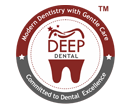Are You Having Tooth Senstivity ?
Tooth Sensitivity can start when gums pull away from the teeth or when gum tissue is lost. Gum loss may start as a result of brushing too hard, not brushing or flossing regularly. The exposed soft part of your tooth can cause pain. It can even affect or change your eating, drinking and breathing habits.
When gum loss occurs, the part of the tooth below the gum line can be exposed. This is called the tooth root. There are tiny tunnels that contain fluid which pass from the tooth root to the tooth’s nerve center. This nerve center is called the pulp. When heat or cold touches these tunnels, the tooth fluid can excite the nerve, causing pain in your teeth.

What causes sensitive teeth?
Brushing: Brushing too hard or not brushing correctly, can cause enamel to be worn away – particularly where the teeth meet the gums. The freshly exposed dentine may then become sensitive.
Gum disease : A build – up of plaque or tartar can cause the gum to recede down the tooth and even destroy the bony support of the tooth. Pockets can form in the gums around the tooth, making the area difficult to keep clean and the problem gets worse. The pockets also lead to periodontist.
Teeth grinding: It is a habit which involves clenching and grinding the teeth together. This can cause the enamel of the teeth to be worn away, making the teeth sensitive.
Cracked or Fractured teeth: Due to cuspal or root fracture you are likely to experience sensitivity. Extreme temperatures, especially cold, may cause discomfort.
Recent filling and Decayed teeth: Recently restored restoration like amalgam or composite restoration may cause sensitivity. Sensitivity could be due too hot, cold or sweet food and drinks. Since the tooth structure becomes soft and more porous with a cavity, the outer enamel layer can no longer protect the tooth sufficiently and cause the tooth to become sensitive.
Is tooth sensitivity a common condition?
Tooth sensitivity is one of the most common complaints among dental patients. One out of eight adults is suffering from sensitivity. The common age group for sensitivity is from 20 to 70 years.
How can I prevent tooth sensitivity?
- Brush your teeth twice a day and floss frequently to prevent gum disease – Be sure to clean all parts of your mouth, including between teeth and along the gum line. Change your toothbrush every two to three months before it become worse.
- Avoid acidic foods and drinks. Try to have them in mealtimes. If you still have sensitivity, talk to your dentist. They may have other suggestions.
3.If you are thinking about having your teeth bleached then discuss sensitivity with your dentist before starting the bleaching procedure.
Is there anything I should avoid if I have sensitive teeth?
You are more likely to feel the sensitivity when drinking, eating something cold or hot, so I avoid, If you have sensitivity when brushing your teeth with cold water, you may need use warm water instead. It is important to keep brushing your teeth regularly. If you don’t, this could make the problem worse.
Treatment for sensitive teeth
If sensitivity is due to a cavity, a restoration can be placed. If gum disease is the cause, the dental professional can perform a thorough cleaning of the area. You should go to a best dentist in chandigarh To reduce pain due to grinding or clenching, the dentist will make a plastic night guard. Use the guard while you sleep.
In office procedures:
- Fluoride varnish can be applied to exposed area strengthening the enamel and dentin.
- Fluoride foam or gel can be placed into a mouth tray then the tray will be placed in your mouth for 3-5 minutes providing the teeth with a high concentration of fluoride strengthen the areas.
- Bonding agent, the material used to stick tooth colored restorations to teeth, can be used to seal the dentin surface and provide a barrier to the stimuli that cause sensitivity.
- In cases where hypersensitivity is still persistent even after the above mentioned procedures, your dentist may recommend root canal treatment for your problem.
Always seek a dental professional’s help – do not try to diagnose this problem yourself. It may be the sign of something more serious. Meet your dentist regularly, as often as they recommend.

